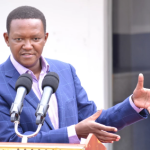Tensions are rising in Bangladesh as both anti-government protesters and the governing Awami League plan to hold rallies across the country on Sunday. These demonstrations come in the wake of deadly violence during protests last month over quotas in civil service jobs, which resulted in over 200 fatalities.
In a significant crackdown, security forces have reportedly detained around 10,000 individuals in the past two weeks, including opposition supporters and students. The Students Against Discrimination group, which is organizing the anti-government protests, has called on Prime Minister Sheikh Hasina to resign.
They have initiated a nationwide disobedience movement starting Sunday, urging citizens to refrain from paying taxes or utility bills and calling for a shutdown of all factories and public transport. Meanwhile, the Awami League, the party led by Ms. Hasina, is also conducting marches throughout the country on the same day.
With both sides preparing for rallies, there are growing concerns about potential violence. The coming days are viewed as crucial for both factions.
“Sheikh Hasina should not only resign, there should be a trial for the killings, looting and corruption,” Nahid Islam, one of the student movement’s leaders, told thousands of people at a gathering on Saturday in Dhaka.
The protests present a significant challenge for Prime Minister Sheikh Hasina, who was re-elected for a fourth consecutive term in the January elections, which were boycotted by the main opposition. Students took to the streets last month to protest the reservation of many civil service jobs for relatives of veterans from Bangladesh’s 1971 independence war with Pakistan.
Although the government has since scaled back most of the quotas following a ruling, students have continued to demonstrate, demanding justice for those killed and injured in the protests and calling for Ms. Hasina’s resignation. However, supporters of Ms. Hasina have firmly ruled out her stepping down.
Earlier, Ms. Hasina extended an offer for unconditional dialogue with student leaders, expressing her desire to end the violence. “I want to sit with the agitating students of the movement and listen to them. I want no conflict,” she stated. Despite this, the student protesters have rejected her offer.
In response to the escalating violence, including the burning of several police stations and state buildings, Ms. Hasina called in the military last month to restore order. The Bangladeshi army chief, General Waker-Uz-Zaman, held a meeting with junior officers in Dhaka to assess the security situation.
“Bangladesh Army has always supported the people and will continue to do so in the interest of the public and whenever the state is in need,” General Zaman stated, according to a release from the Inter-Services Public Relations Directorate.
Protests have resumed in several cities, and the government is struggling to manage the growing discontent over its initial response to the demonstrations. Bangladeshi media report that most of those killed in last month’s protests were shot dead by police, with thousands more injured. The government maintains that police opened fire only in self-defense and to safeguard state properties.



